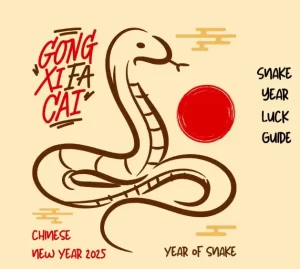Want to attract prosperity, happiness, and good luck in the Year of the Snake? 🐍 Chinese New Year is just around the corner, and it’s the perfect time to embrace traditions that have been practiced for centuries!
🎉 From wearing lucky red 🔴 to feasting on tikoy 🍡 and giving ang pao 🧧, discover how Filipinos celebrate this vibrant festival and the simple yet meaningful practices you can follow to usher in a year filled with good fortune.
Get ready to welcome the Lunar New Year with open arms and a heart full of hope! 💕


Advertisement:

🧧 Unlock Good Fortune: Your Ultimate Guide to Chinese New Year Good Luck Practices in the Philippines 🍀
Table of Contents
Chinese New Year in the Philippines: A Fusion of Traditions
Chinese New Year, also known as the Spring Festival or Lunar New Year, is a significant celebration in the Philippines, home to a vibrant Filipino-Chinese community. It’s a time when ancient Chinese customs blend seamlessly with Filipino hospitality, creating a unique and joyous occasion. 🎊 While the date follows the lunar calendar, in the Philippines, the celebration often includes a special non-working holiday, allowing everyone to participate in the festivities.
Good Luck Practices: Your Guide to a Prosperous New Year
Here’s a comprehensive guide to the good luck practices commonly observed during Chinese New Year in the Philippines:
Before the New Year:
- Spring Cleaning: 🧹 Deep clean your home thoroughly before New Year’s Day to sweep away any bad luck from the previous year and make room for new, positive energy. This is a practice done also by Filipinos during the New Year (Gregorian Calendar).
- Settle Debts: Pay off any outstanding debts to start the new year with a clean slate, both financially and symbolically. 💵
- Decorate Your Home: 🏠 Adorn your home with auspicious symbols and decorations, particularly in red and gold.
- Red Lanterns: 🏮 Hang red lanterns to ward off evil spirits and attract good luck.
- Chinese Couplets: Display auspicious phrases written on red paper, such as those wishing for prosperity, health, and happiness.
- Paper Cuttings: Decorate with intricate paper cuttings featuring auspicious symbols like the year’s zodiac animal, the Chinese character for “fu” (福) meaning good fortune, or images of the money god.
- Blooming Plants: 🌼 Display plants like orchids, lucky bamboo, or branches of plum or peach blossoms to symbolize renewal and growth.
- Images of the Zodiac Animal: Since 2025 is the Year of the Snake, incorporating snake imagery into your decorations can be particularly auspicious.
- Prepare Lucky Foods:
- Tikoy: The must-have sticky rice cake is given away and served during the new year.
- Round Fruits: Prepare 12-13 different kinds of round fruits like oranges, pomelos, etc.
- New Clothes: 👕 It is believed that wearing new clothes during the new year symbolizes new beginnings and warding off bad luck from the previous year.
On New Year’s Eve:
- Family Reunion Dinner: Gather with family for a special meal on New Year’s Eve. 👨👩👧👦 This is considered the most important meal of the year, symbolizing family unity and togetherness. Share a sumptuous feast filled with auspicious dishes.
- Open Doors and Windows: Let the old year’s energy out and welcome the new year’s positive energy.
- Stay Up Late (Shousui): Traditionally, family members stay up late on New Year’s Eve to bid farewell to the old year and welcome the new one. It’s also believed to bring longevity to one’s parents.
- Set Off Firecrackers at Midnight: While firecracker use is regulated, the loud noise is believed to scare away evil spirits and bad luck.
On New Year’s Day and Beyond:
- Wear Red: 💃 Dress in red attire to attract good luck and positive energy throughout the year.
- Give and Receive Ang Pao: Share blessings and good fortune by giving and receiving red envelopes filled with money. 🧧
- Greet Each Other: Offer good wishes to family and friends by saying “Kung Hei Fat Choi” (Cantonese) or “Gong Xi Fa Cai” (Mandarin).
- Visit Family and Friends: Strengthen bonds and share blessings with loved ones during this special time.
- Visit a Temple: Offer prayers and incense at a temple to seek blessings for the new year. 🙏
- Watch a Dragon or Lion Dance: These vibrant performances are a must-see during Chinese New Year and can be found in Chinatowns, malls, and even in front of businesses.
Auspicious Foods and Their Symbolic Meanings:
| Food | Symbolism |
|---|---|
| Tikoy (Nian Gao) | Progress, advancement, growing taller or achieving greater heights in the new year |
| Dumplings | Wealth, prosperity (shaped like ancient Chinese ingots) |
| Fish | Abundance, surplus (the Chinese word for “fish” sounds like the word for “surplus”) |
| Spring Rolls | Wealth (golden color and shape resemble gold bars) |
| Long Noodles | Longevity (should be eaten without cutting) |
| Oranges/Tangerines | Good luck, wealth, fullness (round shape and golden color; the word for mandarin sounds like “luck” or “gold”) |
| Pomelos | Abundance, prosperity, good health |
| Sweet Treats | A sweet and মধুর life in the new year |
Where to Immerse Yourself in the Festivities:
- Binondo, Manila (Chinatown): 🎊 The ultimate destination for experiencing Chinese New Year in the Philippines. The streets come alive with dragon and lion dances, food stalls, and a vibrant atmosphere.
- Other Chinatowns: 🎉 Cities like Davao, Cebu, and Baguio also have their own Chinatowns and unique celebrations.
- Shopping Malls: 🛍️ Many malls across the country host special events, performances, and offer Chinese New Year-themed promotions.
- Chinese Temples: 🙏 A place for prayer and reflection during the new year.
- Hotels and Resorts: 🏨 Many establishments offer special Chinese New Year packages and events.
Frequently Asked Questions (FAQs)
What are some lucky foods to eat during Chinese New Year?
Tikoy, dumplings, fish, spring rolls, long noodles, oranges, and other round fruits are considered lucky.
What does “Kung Hei Fat Choi” mean?
It’s a Cantonese greeting that means “Happy New Year” or “Wishing you prosperity.” The Mandarin equivalent is “Gong Xi Fa Cai.”
Why are firecrackers used during Chinese New Year?
Traditionally, the loud noise of firecrackers is believed to scare away evil spirits and bad luck. However, their use is regulated in the Philippines, so be sure to check local ordinances.
What is the best way to experience Chinese New Year in the Philippines?
Visiting Binondo Chinatown in Manila offers the most immersive experience. However, many cities and malls across the country also hold their own celebrations.
What are the characteristics of the Snake zodiac sign?
People born in the Year of the Snake are often considered wise, intuitive, intelligent, elegant, and determined.
Pinoy Trending Disclaimer
Pinoy Trending informs that this article is intended for informational and cultural purposes only. It provides a general overview of Chinese New Year good luck practices observed in the Philippines. Beliefs and practices may vary among individuals and families. Pinoy Trending is not responsible for any actions taken based on the information presented in this article.
References
- Federation of Filipino Chinese Chambers of Commerce & Industry, Inc. (FFCCCII):
- Department of Tourism – Philippines:
- Official Gazette of the Republic of the Philippines: https://www.officialgazette.gov.ph/
- Chua, M. C. (2019). Chinese New Year Traditions in the Philippines. Ateneo de Manila University Press.
- Tan, A. S. (2015). The Chinese in the Philippine Economy. Ateneo de Manila University Press.
- Wang, G. (2005). Chinese New Year: A Celebration for Everyone.
- Time and Date. Chinese New Year dates and Animal. https://www.timeanddate.com/calendar/chinese-zodiac-signs.html
- KarmaWeather: https://www.karmaweather.com/
- Chinese Zodiac: https://www.chinesezodiac.com/
- ChatGPT
- Gemini
Stay Connected with Pinoy Trending:
To stay informed on the latest news, viral stories, and trending topics, connect with us through the following channels:
- Facebook Page: Follow, like, and engage with our content on our official Facebook page: https://web.facebook.com/PIN0YTrending/
- Telegram Channel: Subscribe to our Telegram channel for exclusive updates and breaking news: http://t.me/pinoytrendingofficial
- Facebook Group: Join our community and participate in discussions within our Facebook group: web.facebook.com/groups/pin0ytrending/
- Website: Explore in-depth articles and a wider range of content on our official website: https://pinoytrending.com/
- Email: For inquiries, feedback, or other correspondence, please email us at: pinoytrending99@gmail.com
We look forward to connecting with you!
Josh is a seasoned content writer and journalist with over 15 years of experience creating impactful, accurate, and engaging content across industries like technology, healthcare, finance, and media. He specializes in translating complex topics into clear, accessible narratives and excels in technical documentation, editorial writing, and marketing materials.
A skilled journalist, Josh delivers in-depth features and articles that resonate with readers. Known for his attention to detail, research skills, and reliability, he is dedicated to producing high-quality content that informs, educates, and inspires.


